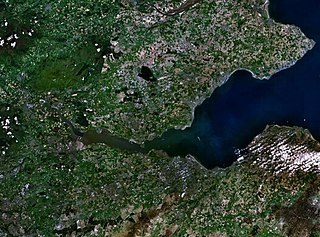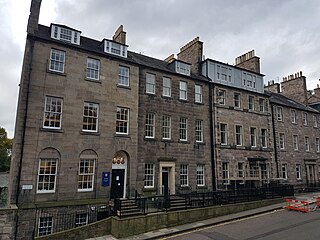
A Burns supper is a celebration of the life and poetry of the poet Robert Burns, the author of many Scots poems. The suppers are normally held on or near the poet's birthday, 25 January, known as Burns Night also called Robert Burns Day or Rabbie Burns Day. However, in principle, celebrations may be held at any other time of the year. Burns suppers are held all around the world.

Ulster Scots or Ulster-Scots, also known as Ulster Scotch and Ullans, is the dialect of Scots spoken in parts of Ulster in Northern Ireland and the Republic of Ireland. It is generally considered a dialect or group of dialects of Scots, although groups such as the Ulster-Scots Language Society and Ulster-Scots Academy consider it a language in its own right, and the Ulster-Scots Agency and former Department of Culture, Arts and Leisure have used the term Ulster-Scots language.

Robert Fergusson was a Scottish poet. After formal education at the University of St Andrews, Fergusson led a bohemian life in Edinburgh, the city of his birth, then at the height of intellectual and cultural ferment as part of the Scottish Enlightenment. Many of his extant poems were printed from 1771 onwards in Walter Ruddiman's Weekly Magazine, and a collected works was first published early in 1773. Despite a short life, his career was highly influential, especially through its impact on Robert Burns. He wrote both Scottish English and the Scots language, and it is his vivid and masterly writing in the latter leid for which he is principally acclaimed.

Scottish literature is literature written in Scotland or by Scottish writers. It includes works in English, Scottish Gaelic, Scots, Brythonic, French, Latin, Norn or other languages written within the modern boundaries of Scotland.
Scottish English is the set of varieties of the English language spoken in Scotland. The transregional, standardised variety is called Scottish Standard English or Standard Scottish English (SSE). Scottish Standard English may be defined as "the characteristic speech of the professional class [in Scotland] and the accepted norm in schools". IETF language tag for "Scottish Standard English" is en-scotland.

Robert Henryson was a poet who flourished in Scotland in the period c. 1460–1500. Counted among the Scots makars, he lived in the royal burgh of Dunfermline and is a distinctive voice in the Northern Renaissance at a time when the culture was on a cusp between medieval and renaissance sensibilities. Little is known of his life, but evidence suggests that he was a teacher who had training in law and the humanities, that he had a connection with Dunfermline Abbey and that he may also have been associated for a period with Glasgow University. His poetry was composed in Middle Scots at a time when this was the state language. His writing consists mainly of narrative works. His surviving body of work amounts to almost 5000 lines.

Scottish nationalism promotes the idea that the Scottish people form a cohesive nation and national identity.
The Scottish Renaissance was a mainly literary movement of the early to mid-20th century that can be seen as the Scottish version of modernism. It is sometimes referred to as the Scottish literary renaissance, although its influence went beyond literature into music, visual arts, and politics. The writers and artists of the Scottish Renaissance displayed a profound interest in both modern philosophy and technology, as well as incorporating folk influences, and a strong concern for the fate of Scotland's declining languages.

A makar is a term from Scottish literature for a poet or bard, often thought of as a royal court poet.

Canadian Gaelic or Cape Breton Gaelic, often known in Canadian English simply as Gaelic, is a collective term for the dialects of Scottish Gaelic spoken in Atlantic Canada.

Kathleen Jamie FRSL is a Scottish poet and essayist. In 2021 she became Scotland's fourth Makar.
Derick Smith Thomson was a Scottish poet, publisher, lexicographer, academic and writer. He was originally from Lewis, but spent much of his life in Glasgow, where he was Professor of Celtic at the University of Glasgow from 1963 to 1991. He is best known for setting up the publishing house Gairm, along with its magazine, which was the longest-running periodical ever to be written entirely in Gaelic, running for over fifty years under his editorship. Gairm has since ceased, and was replaced by Gath and then STEALL. He was an Honorary President of the Scottish Poetry Library, and a Fellow of the Royal Society of Edinburgh and the British Academy. In June 2007, he received an honorary degree from Glasgow University.
Matthew Purdie McDiarmid was a Scottish literary scholar, essayist, campaigning academic and poet. He was a founding member of the Association for Scottish Literary Studies (1970) and the first president of the Robert Henryson Society which he also helped to found in 1993.

The Castalian Band is a modern name given to a grouping of Scottish Jacobean poets, or makars, which is said to have flourished between the 1580s and early 1590s in the court of James VI and consciously modelled on the French example of the Pléiade. Its name is derived from the classical term Castalian Spring, a symbol for poetic inspiration. The name has often been claimed as that which the King used to refer to the group, as in lines from one of his own poems, an epitaph on his friend Alexander Montgomerie:

The School of Scottish Studies was founded in 1951 at the University of Edinburgh. It holds an archive of approximately 33,000 field recordings of traditional music, song and other lore, housed in George Square, Edinburgh. The collection was begun by Calum Maclean - brother of the poet, Sorley MacLean - and the poet, writer and folklorist, Hamish Henderson, both of whom collaborated with American folklorist Alan Lomax, who is credited as being a catalyst and inspiration for the work of the school.

Kinnesswood, possibly from the Scottish Gaelic: Ceann eas ciad is a village in Perth and Kinross, Scotland, and is in the historic county of Kinross-shire. It lies to the east of Loch Leven, on the A911 road, below Bishop Hill in the Lomond Hills. It is approximately 4 miles west of Glenrothes and 4 miles east of Kinross.

The Scottish people or Scots are an ethnic group and nation native to Scotland. Historically, they emerged in the early Middle Ages from an amalgamation of two Celtic peoples, the Picts and Gaels, who founded the Kingdom of Scotland in the 9th century. In the following two centuries, Celtic-speaking Cumbrians of Strathclyde and Germanic-speaking Angles of Northumbria became part of Scotland. In the High Middle Ages, during the 12th-century Davidian Revolution, small numbers of Norman nobles migrated to the Lowlands. In the 13th century, the Norse-Gaels of the Western Isles became part of Scotland, followed by the Norse of the Northern Isles in the 15th century.

Poetry of Scotland includes all forms of verse written in Brythonic, Latin, Scottish Gaelic, Scots, French, English and Esperanto and any language in which poetry has been written within the boundaries of modern Scotland, or by Scottish people.

Scots-language literature is literature, including poetry, prose and drama, written in the Scots language in its many forms and derivatives. Middle Scots became the dominant language of Scotland in the late Middle Ages. The first surviving major text in Scots literature is John Barbour's Brus (1375). Some ballads may date back to the thirteenth century, but were not recorded until the eighteenth century. In the early fifteenth century Scots historical works included Andrew of Wyntoun's verse Orygynale Cronykil of Scotland and Blind Harry's The Wallace. Much Middle Scots literature was produced by makars, poets with links to the royal court, which included James I, who wrote the extended poem The Kingis Quair. Writers such as William Dunbar, Robert Henryson, Walter Kennedy and Gavin Douglas have been seen as creating a golden age in Scottish poetry. In the late fifteenth century, Scots prose also began to develop as a genre. The first complete surviving work is John Ireland's The Meroure of Wyssdome (1490). There were also prose translations of French books of chivalry that survive from the 1450s. The landmark work in the reign of James IV was Gavin Douglas's version of Virgil's Aeneid.
William Hershaw is a Scottish poet, playwright, musician and Scots language activist.